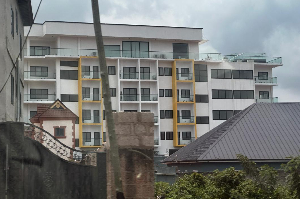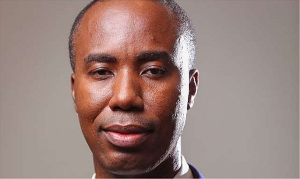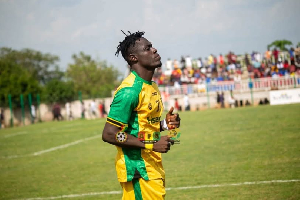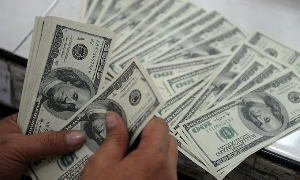By Kwame Okoampa-Ahoofe, Jr., Ph.D.
In February 1990, when Mr. Mandela was finally released by Mr. F. W. deKlerk, Apartheid South Africa's last president, from the Pollsmoor Maximum-Security Prison, in the Cape Town suburb of Tokai, a godforsaken facility for the most-hardened criminals, to be certain, he was 72 years old and looked haggard, thoroughly grayed and wiry. He looked completely different from the various photographs of the man in which he looked young, sturdy and handsome. When he emerged out of Pollsmoor, The Madiba decidedly looked like the veritable "ghost of his former self," as great historians like Mr. F. K. Buah and Prof. Albert A. Adu-Boahen would have put it.
Naturally, I was livid with anger, regret, shame and frustration than being hopeful and joyful. I thought that he had been reluctantly let out of Pollsmoor by his racist Boer captors because the DeKlerk-led Apartheid government was deathly afraid of the bloody and chaotic consequences if the old warrior were to expire in prison. And he eerily and visibly looked as if he did not have much long to live among the people he so dearly loved, and for whose righteous cause he had been put away for nearly three decades. Once or twice, I had even written a poem in celebration of his birthday as a student of St. Peter's Secondary School (PERSCO), at Okwawu-Nkwatia, in Ghana.
Yes, I was so livid with fury about the timing of the release of The Madiba from prison that I had written and published an article in The Campus newspaper, at the City College of New York of the City University of New York (CCNY of CUNY), expressing just that. I had a regular weekly column in The Campus called "The Jagged Edge." The title of my column had been exclusively chosen for me by the paper's Editor-in-Chief, Cindy Rodriguez, a Puerto Rican-American wit and quite a bombshell. Today Ms. Rodriguez, after a quite eventful, exciting and successful career as a reporter for several newspapers across the United States, and having reported from such hot and troubled spots as the Middle-East, North Africa and Asia, has settled down and been named Writer-in-Residence at Boston's Emerson College.
Cindy had chosen the radically aggressive title of "The Jagged Edge," because she found my weekly fare to be rather relentlessly trenchant. The 1980s and '90s were quite turbulent on the global political scene; and I far preferred to spotlight such harrowing and heart-rending issues as the largely Western-provoked 8-year internecine war between Saddam Hussein's Iraq and the revolutionary and "religious" Iran of the Ayatollahs; and also the civil war between the pro-Soviet Mullahs and the pro-American forces in Afghanistan, than the generally poor quality of the food served by the College's cafeteria staff which most of the student reporters and columnists for The Campus bitterly complained about on a weekly basis. Besides, I did not know much about American foods to register any "connoiseurian" or expert judgments and/or evaluations.
Once or twice, a College faculty member called me into his or her office and congratulated me for "your rather remarkable, thematically expansive and edifying cloumns in The Campus." Among such faculty members were Professors Leonard Jeffries, James Small, Francine Doby, Nathaniel Norment, Raymond R. Patterson, Grande, Edward Scobie, Max Manigat, Frank Laraque and Jane Marcus. Some quietly and tacitly registered their approbation and admiration for my writings from "a safe distance," obviously because they did not want to be envisaged and accused of being behind some of the ideologically poignant articles that frontally took on the Big Kahunas of the College's administration, largely having to do with the raging culture wars.
Once, I walked into a meeting, I forget exactly what it was about, only to have Dr. Bernard Harleston, City College's President, rise up from his chair at the head of the table to give me a vigorous handshake and heartily commend me for both "your prolific and qualitative articles in The Campus." I had just been named a Ford Foundation Undergraduate Fellow of the English Department. I was amazed, awestruck and nearly overwhelmed. Dr. Harleston would later turn somewhat frigid when I began to fiercely, staunchly and spiritedly defend Dr. Jeffries with whom he had openly and publicly clashed over the radically "race-laced" teachings and lectures of the then-Chairman of the Africana Studies Department. President Harleston wanted Dr. Jeffries fired. That was not apt to be easy, as Dr. Jeffries was not only tenured and institutionally entrenched, he also had quite a remarkable following and legions of sympathizers in the predominantly African-American Harlem community who were ready to go to bat for him, as it were.
Actually, it was Dr. Jeffries who had gone public and rabidly scurrilous with his attacks on Dr. Harleston in this otherwise patently pedestrian clash of pedagogical ideologies. Dr. Harleston would shortly thereafter resign his College President's post and take up an appointment with Harvard University's School of Education. The Africana Studies Department would also later be dissolved and merged with other area studies programs into an Ethnic-Studies Program, with Dr. Jeffries being bumped into a reluctant Department of Political Science, with courses cocktailed for him between the former and latter departments.
Yes, on February 11, 1990, or thereabouts, when The Madiba was released from Cape Town's Pollsmoor Maximum-Security Prison, I penned and published an article captioned "The Old Man of Apartheid Returns Home," or some such rather bizarre caption. Naturally, some of my readers complained that such title was rather too languid and unreflective of the contents of my article, as well as the globally lionized stature of my protagonist. Needless to say, the title of the article had neither been conceived nor chosen by me. It had exclusively been the decision of the Editor-in-Chief of The Campus. And I was quite a bit annoyed and wistful about the same, but Cindy thought my original caption of "The Old Warrior Returns Home" was somewhat too belligerent a characterization of a pensive, sedate and placid-looking man whom the entire world had come to envisage as a veritable symbol of peace and a post-Apartheid South Africa's multiracial and multicultural unifier. In retrospect, Cindy was absolutely right!
__________________________________________________________
*Kwame Okoampa-Ahoofe, Jr., Ph.D.
Department of English
Nassau Community College of SUNY
Garden City, New York
Dec. 8, 2013
E-mail: okoampaahoofe@optimum.net
###
Opinions of Tuesday, 10 December 2013
Columnist: Okoampa-Ahoofe, Kwame














